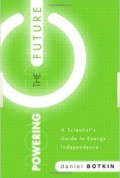 This week I read “Powering The Future,” by Daniel B. Botkin. I was motoring along learning about our current energy mix (fossil fuels, fossil fuels, fossil fuels) and then moved on to the section about alternative energy and his evaluation of the viability of wind and solar. Then I got to the biofuels section and this is where in most books I feel authors are either uneducated or intentionally dismiss the data. Botkin was no different in his assessment of biofuels. He only supports biofuels from algae and soil bacteria and he backs up much of his biofuels with bad data from the likes of David Pimentel.
This week I read “Powering The Future,” by Daniel B. Botkin. I was motoring along learning about our current energy mix (fossil fuels, fossil fuels, fossil fuels) and then moved on to the section about alternative energy and his evaluation of the viability of wind and solar. Then I got to the biofuels section and this is where in most books I feel authors are either uneducated or intentionally dismiss the data. Botkin was no different in his assessment of biofuels. He only supports biofuels from algae and soil bacteria and he backs up much of his biofuels with bad data from the likes of David Pimentel.
But I’m getting ahead of myself.
The goal that Botkin set out in his book was to discuss each major source of energy including how much energy it provides today, how much it could provide in the future, how much it would cost, and its advantages and disadvantages. On this note, I do think that Botkin set out what he meant to do and offered analogies and numbers that most will understand.
Here are some interesting takeaways from his analysis. First, he is not a proponent of natural gas because his data shows that if it were used to fuel the 140 million+ cars on the road, we’d run out in less than 20 years. Second, he is not a proponent of nuclear because there is a limited amount of uranium and it costs more to decommission a nuclear plant than build one. While he has reservations about coal, he does anticipate that coal use will increase for electricity.
So what does he like?
He is a fan of wind and his calculations show that wind is already competitive per kw as compared to coal. He is also a fan of solar, although he demonstrates that it is still not cost competitive as compared to wind and other forms of electricity. He writes that one percent of the land area in the United States could provide all of the nation’s energy needs, not just electricity (he is a proponent of electric cars). He also notes that the more solar that is installed, the less expensive it will become.
Back to biofuels. Botkin is against all agrifuels. He throws out the food versus food argument – both human and animal feed – he throws out that biofuels are net energy negative, and several environmental arguments including biofuel production increases greenhouse gases (indirect land use). Oh, and I almost forgot, he also claims that they cost us, “more than we realize.”
I don’t have the space to dismiss these bad biofuel arguments – I’ll leave it up to you loyal readers to help me out. And since many of our ethanol and biodiesel associations spend time reach out to those who are uneducated about biofuels, then I strongly suggest you add Botkin to your list. But on a positive note, Botkin’s book is easy to read and he does a good job of laying out ideas for solutions to our energy problems but you’ll have to read the book yourself to discover these solutions. After all, I can’t give away everything now can I?

